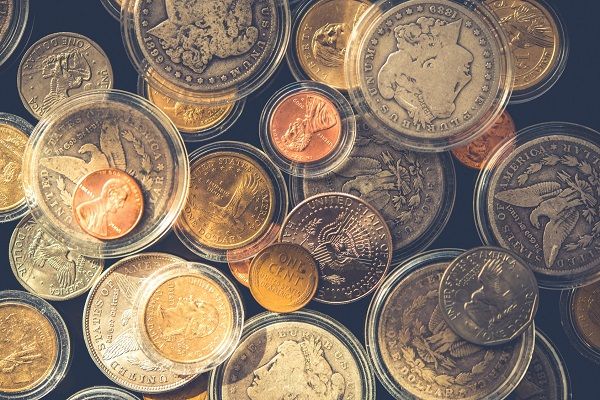Why You Should Diversify into Rare Coins Now
Posted on“May you live in interesting times.” That old expression is actually a Chinese curse.

Over the past decade Federal Reserve officials faced more than their share of interesting times, and they may agree it has indeed been a curse. From the 2008 global financial crisis to last year’s December stock market meltdown to unprecedented political pressure from the Administration to cut interest rates to an epic trade war with the world’s second largest economy. It’s a recipe for interesting times indeed.
“Fear Gauge” Skyrockets
It’s been a roller coaster ride for stock market investors since the start of May thanks to tariff induced price swings. The Cboe Volatility Index, commonly known as the “VIX” or the “Fear Gauge” surged to 34% last week well above the index’s historical average at 19. Huge price swings have become common in 2019. Though May 8, the S&P 500 clocked 13 massive price swings of 1% or more. Make no mistake, after years of ultra-low market turbulence, volatility is back with a vengeance.
Interest Rates: Up or Down?
On the interest rate front, never before have we seen the Federal Reserve stuck in such a daunting position.
- On one hand, the Fed is facing public political pressure from the U.S. Administration to cut interest rates.
- On the other hand, many long-time Fed watchers warn that if the central bank fails to hike interest rates to a historically normal range in the 3.5% area, the Fed will be impotent to combat the next recession.
You might say the Fed is stuck between a rock and a hard place.
Then, There’s the Trade War
Choppy waters lie ahead for investors in the wake of the ever-deepening trade war with China. The U.S. increased tariffs on $200 billion of Chinese imports to 25% from 10% last week, which took the Trade War battle between the world’s two biggest economies to a whole new level.
Some economists speculated the U.S.-China trade war could force the Fed to lower interest rates to help soften the blow of the resulting slower economic growth.
- In fact, the exact opposite scenario could be the true outcome. The Fed may be forced to raise interest rates because of the Trade War.
Trade Wars Are Inflationary
Walmart, the world’s largest retailer’s chief financial officer told Reuters this week, that higher tariffs will result in increased prices for consumers.
No matter how anyone spins it, trade wars are inflationary. The 25% tariff is a tax that U.S. businesses must pay when the Chinese imports come into the U.S. That tax will be passed along to U.S. consumers.
“Ultimately consumers are going to be very surprised,” said Peter J. Bragdon, chief administrative officer for Columbia Sportswear Co., said in a Washington Post article.
“They’ve been told they won’t see any rise in prices, and that’s just not true,” Bragdon said.
American families will pay an extra $767 a year on everyday items like suitcases, cribs and clothing following Friday’s tariffs, according to a report by the Trade Partnership, a Washington-based research and consulting firm.
Here’s Why The Fed Could Raise Rates
While the Federal Reserve has been stumped in recent years by the near non-existence of inflation, the trade war could be the catalyst for a big jump in inflation.
“It is possible that Mr. Trump’s tariffs could lift prices in the United States. It might even boost the Federal Reserve’s preferred inflation gauge toward — or over — the central bank’s 2 percent goal,” a May 16 New York Times article stated.
What does this all mean? Answer: The Fed will be forced to raise interest rates to fight back against inflation.
Investors Should Expect More Market Swings
Trade wars, rising inflation, rising interest rates and an aging stock market cycle add up to a bumpy road ahead for stock market investors. The current bull market is now the longest since World War II and market analysts are well aware that volatility increases as markets build major tops.
While we are not predicting a market meltdown, we wouldn’t be surprised if that occurred.
Rebalancing Your Portfolio with Rare Coins
The volatility in the stock market is approaching all-time record highs. With some stocks at record highs, investors are rebalancing their portfolio and increasing their allocation of alternative assets such as rare coins and gold.
Rare coins and gold are non-correlated to the stock market, which means they don’t move together. Typically, during times of equity market stress, gold climbs sharply as investors pile into precious metals seeking safety.
Inflation also has a powerful impact on rare coin values. For example, from 2001 to 2007, the inflation rate in the U.S. went from just under 2% to 4%. Rare coin prices rose substantially during this time. Will this happen again? Just listen to the Federal Reserve. For some time, they have publicly stated a 2% rate of inflation goal. Now, on numerous occasions, the Fed has stated that they feel we will overshoot that rate and that they are okay with that happening. The Trade War may just be the catalyst the Fed was looking for to give them the excuse to hike interest rates sharply in the coming months.
Is your portfolio ready?







